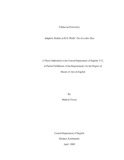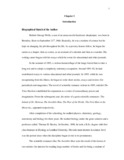Please use this identifier to cite or link to this item:
https://elibrary.tucl.edu.np/handle/123456789/2871| Title: | Adaptive Failure in H.G. Wells’ The Invisible Man |
| Authors: | Tiwari, Mahesh |
| Keywords: | English Literature;Literary Criticism;Literary History;English;The Invisible Man;H.G. Wells |
| Issue Date: | Mar-2009 |
| Publisher: | Central Department of English Kirtipur, Kathmandu |
| Abstract: | The Invisible Man elucidates Wells’ extraordinary power and imagination of making perfect fusion of literature with science. It excavates an individual’s struggle in the society to reach the pinnacle of success at the cost of being indifferent to its society as well as towards its surrounding. Griffin’s obsession in science that he assumes would pave the way and lead him to his destination, extends up to the extent that he even denies his responsibility towards his family. With his harsh labour, he achieves the state of ‘Invisibility’ that makes him optimistic to reach his goals. Ironically, the means for his optimism becomes the cause of his own death. Hence, the novel ends by successfully exploring the hypothesis that the protagonist’s failure is due to his inability to adapt in society and environment. |
| URI: | http://elibrary.tucl.edu.np/handle/123456789/2871 |
| Appears in Collections: | English |
Files in This Item:
| File | Description | Size | Format | |
|---|---|---|---|---|
| Cover Page.pdf | 118.71 kB | Adobe PDF |  View/Open | |
| thesis.pdf | 391 kB | Adobe PDF |  View/Open |
Items in DSpace are protected by copyright, with all rights reserved, unless otherwise indicated.
